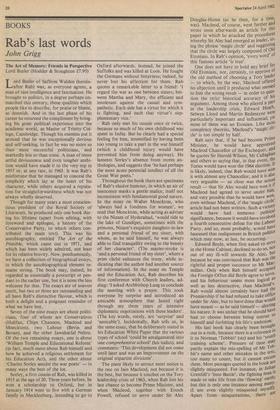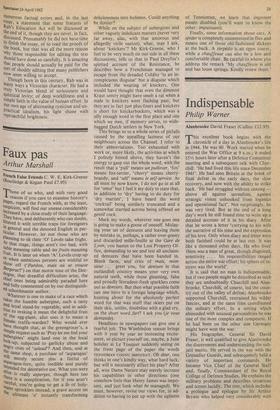BOOKS
Rab's last words
John Grigg
Lord Butler of Saffron Walden (herein- after Rab) was, as everyone agrees, a man of rare intelligence and fascination. He brought to politics, in a degree perhaps un- matched this century, those qualities which people like to describe, for praise or blame, as donnish. And in the last phase of his career he returned the compliment by bring- ing his great political experience into the academic world, as Master of Trinity Col- lege, Cambridge. Though his enemies put it around that he was exceptionally devious and self-seeking, in fact he was no more so than most successful politicians, and markedly less so than some. A man of more artful deviousness and even tougher ambi- tion would have made it to the very top in 1957 or, at any rate, in 1963. It was Rab's misfortune that he managed to conceal the simplicity which lay at the heart of his character, while others acquired a reputa- tion for straightforwardness which was not always wholly deserved.
Though for many years a most conscien- tious president of the Royal Society of Literature, he produced only one book dur- ing his lifetime (apart from editing, with foreword and epilogue, a history of the Conservative Party, to which others con- tributed the main text). This was his autobiography, entitled The Art of the Possible, which came out in 1971, and which has been widely admired, not least for its relative brevity. Now, posthumously, we have a collection of biographical essays, in which the autobiographical element re- mains strong. The book may, indeed, be regarded as essentially a postscript or pen- dant to the earlier one, but it is none the less welcome for that. The essays are of uneven merit, but two or three are outstanding and all have Rab's distinctive flavour, which is both a delight and a poignant reminder of what we have lost.
Seven of the nine essays are about politi- cians, four of whom are Conservatives (Halifax, Chips Channon, Macleod and Monckton), two Labour (Bevin and Bevan), and the other Jawaharlal Nehru. Of the two remaining essays, one is about `William Temple and Educational Reform' (in fact, much more about Rab himself and how he achieved a religious settlement for his Education Act), and the other about 'Charles Sorley amidst the war poets' — in many ways the best of the lot.
Sorley, a first cousin of Rab, was killed in 1915 at the age of 20. Three years before, he won a scholarship to Oxford, but in January 1914 went to live with a German family in Mecklenburg, intending to go to
Oxford afterwards. Instead, he joined the Suffolks and was killed at Loos. He fought the Germans without bitterness; indeed, he never lost his affection for them. Rab quotes a remarkable letter to a friend: 'I regard the war as one between sisters, bet- ween Martha and Mary, the efficient and intolerant against the casual and sym- pathetic. Each side has a virtue for which it is fighting, and each that virtue's sup- plementary vice.'
Rab only met his cousin once or twice, because so much of his own childhood was spent in India. But he clearly had a special feeling for him, intensified by having been too young to take a part in the war himself (which a childhood injury would have prevented him from doing anyway). He laments Sorley's absence from recent an- thologies, and suggests that 'he had perhaps the most acute potential intellect of all the Great War poets.'
Throughout the book there are specimens of Rab's elusive humour, in which an air of innocence masks a gentle malice, itself not inconsistent with fundamental good nature. In the essay on Walter Monckton, who `always had a fondness for women', we read that Monckton, while acting as adviser to the Nizam of Hyderabad, 'would ride to the lake of Gundipet, sometimes with the princess, Nizam's exquisite daughter-in-law and a personal friend of my sister, with whom, as he said himself, he was always able to find tranquility owing to the beauty of her character'. (The master-stroke is `and a personal friend of my sister', where a prim cliche enhances the irony, while in- dicating that the author had another source of information). In the essay on Temple and the Education Act, Rab describes his first conference with Church leaders, ad- ding: 'I asked Archbishop Lang to conclude the meeting with a prayer. This took everyone by surprise and introduced an amicable atmosphere that lasted right through my three years of intensive diplomatic negotiations with these leaders'. (The key words, surely, are 'surprise' and `amicable'). Incidentally, Rab tells us, in the same essay, that he deliberately stated in his Education White Paper that the various types of school 'could be amalgamated into one comprehensive school' (his italics), and comments: 'This development did not come until later and was an improvement on the original tripartite divisions'.
The piece likely to attract most notice is the one on lain Macleod, not because it is the best, but because it touches on the Tory leadership crisis of 1963, when Rab lost his last chance to become Prime Minister, and when Macleod, together with Enoch Powell, refused to serve under Sir Alec
Douglas-Home (as he then, for a time, was). Macleod, of course, went further and wrote soon afterwards an article for this paper in which he attacked the procedures whereby Sir Alec had emerged as leader, us- ing the phrase 'magic circle' and suggesting that the circle was largely composed of Old Etonians. In Rab's opinion, 'every word' of this famous article 'is true'. One does not have to hold any brief for Old Etonians, nor, certainly, to approve of the old method of choosing a Tory leader — to which, by the way, Macleod offered no objection until it produced what seemed to him the wrong result — in order to ques- tion the strict historical accuracy of his argument. Among those who played a part in the leadership crisis, Edward Heath, Selwyn Lloyd and Martin Redmayne were particularly important and influential; Yet none of them was an Etonian. Like most conspiracy theories, Macleod's 'magic cir- cle' is too simple by half. Rah says that, if he had become Prime Minister, he would have appointed Macleod Chancellor of the Exchequer, and he quotes Sir Harold Wilson, Mr Callaghan and others as saying that, in that event, the Tories would have won the 1964 election, It is likely, indeed, that Rab would have won it with almost any Chancellor, and it is also very arguable — so close was the actual result — that Sir Alec would have Wan it if Macleod had agreed to serve under him, and very possible that he would have WO: even without Macleod, if the 'magic circle' article had not been written. Such a victory would have had immense political significance, because it would have involved a fourth consecutive defeat for the Labour Party, and so, most probably, would have hastened that realignment in British politics which may now, at last, be occurring. Edward Boyle, when first asked to serve in the Home Cabinet, declined to do so, not out of any towards Sir Alec, but because he was convinced that Rab was the rightful and proper successor to Mr Mac; millan. Only when Rab himself accepted the Foreign Office did Boyle agree to serve, and his behaviour seems more logical as well as less destructive, than Macleod s• Rab would almost certainly have had the Premiership if he had refused to take office under Sir Alec, but to have done that would have meant — as he said himself altering his nature. It was unfair that he should have had to choose between being untrue to himself and forfeiting his life's ambition. His last book has clearly been brought out in a rush, because there is a reference 10 it to Norman `Tebbite (sic) and his 'youth training scheme'. Pressure of time, maY partly explain the mis-spelling of Mr Teb' bit's name and other mistakes in the text, too many to count, but it cannot excuse them. Most passages quoted in the book are slightly misquoted. For instance, in Julian „ Grenfell's 'Into Battle', the fighting nialti.1' made to take life from the 'flowing' earth' but this is only one instance among manY, (I am even slightly misquoted myself)' Apart from misquotations, there are numerous factual errors and, in the last essay, a statement that some features of Rab's Education Act will be discussed at the end of it, though they are never, in fact, discussed. Presumably he did not have time to finish the essay, or to read the proofs of the book, but that was all the more reason why those responsible for editing the text should have done so carefully. It is amazing that people should actually be paid for the sort of shoddy editing that many publishers now seem willing to accept. Though born in this century, Rab was in many ways a Victorian character. He had a truly Victorian blend of seriousness and quizzical levity; of deep worldliness and a simple faith in the value of human effort. In our own age of alternating cynicism and un- Practical idealism, his light shone with reproachful brightness.







































 Previous page
Previous page